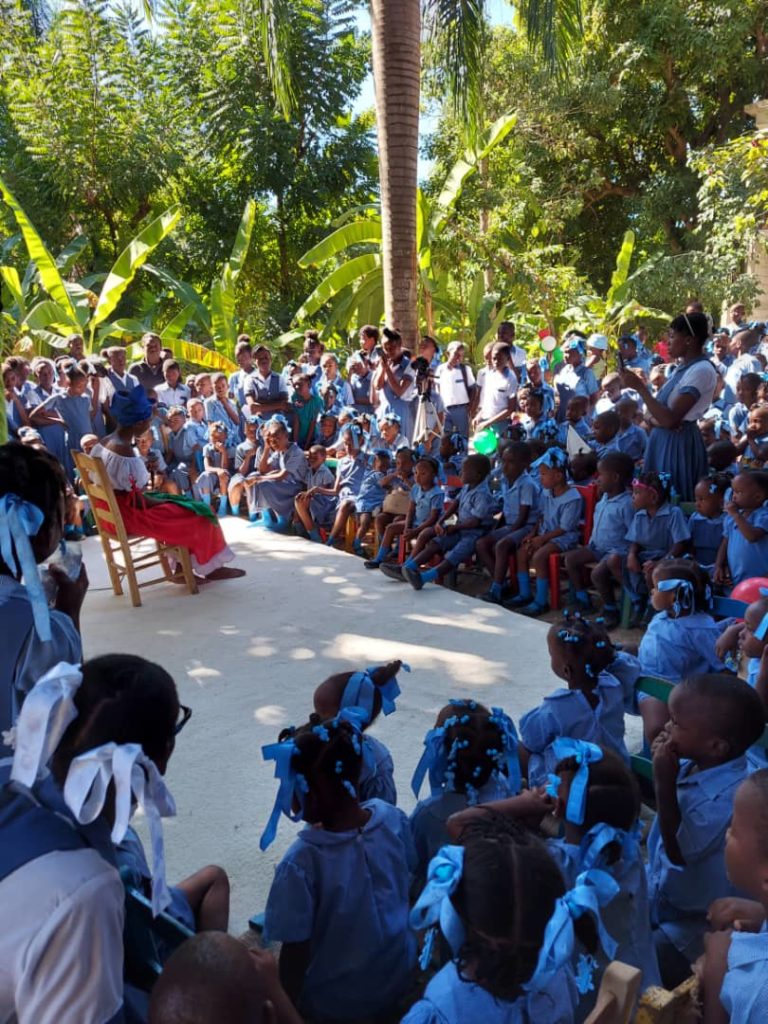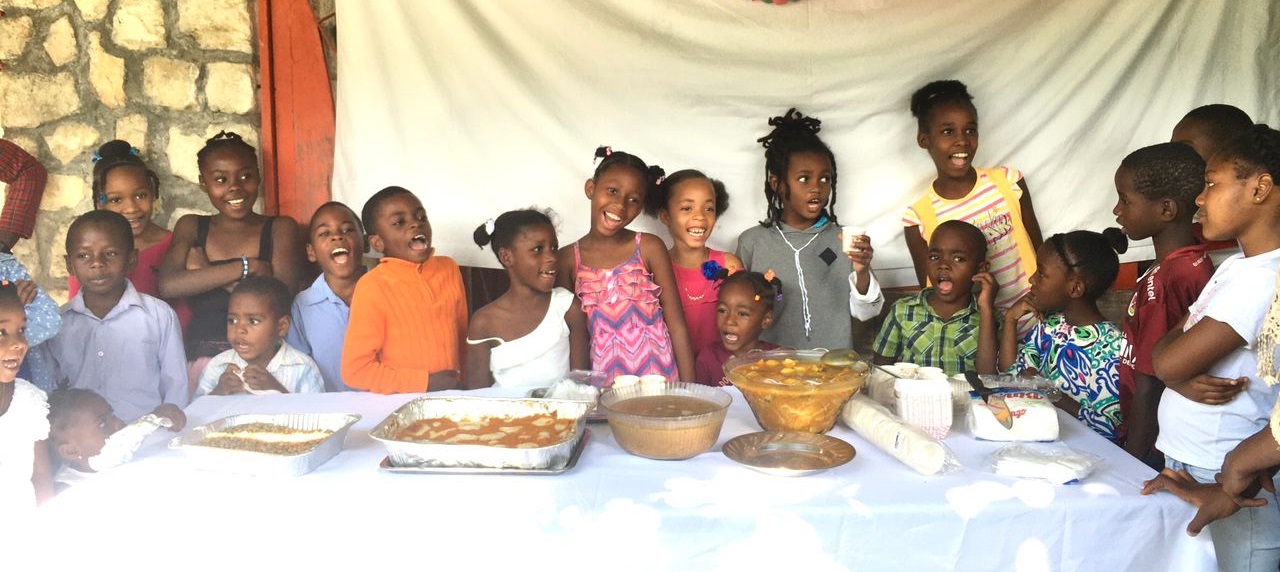Haiti: Manje Lakay is an educational program whose goal is to promote long-term reflection on sustainable production and consumption patterns (SDG 12) and on the balance of ecosystems. It is based on the observation that eating habits are one of the bases of people’s resistance, their strategies of adaptation to the environment and their capacity for resilience. Report.
The little hands are waving around the congo pea pods. The eyes shine. In all the classes today, it is a new kind of activity, they are preparing the MANJE LAKAY which took place in December to close the 21 days of mobilization around the rights of children.
On the desks and benches, sitting on the floor or leaning against a wall, the children are busy. They challenge each other. They invent contests, quickly won, quickly lost: Who has shelled the most peas? Who has the most beautiful seeds? Who knows the most pea recipes? Who has not spilled any seeds on the ground? Who has harvested pigeon peas in their garden? What is the name of the pigeon pea in Senegal?
Laughter is rife. In this island of peace and joy, it is almost hard to imagine that outside there is war.
On the radio the news is bad. Testimonies and calls for help are multiplying: kidnapping in Delmas this morning, 2 men killed in Carrefour, 12 houses burned down in Source-Matelas, please give me back my daughter, she is only 7 years old. Some beg, others protest or inveigh. Hoarse voices tell the daily story of the last massacre, of the hunger, of the ordeal. Paths of the cross. Desert and weariness. The hell of a martyred people offered as a holocaust to greed, armed gangs sowing terror throughout the country.
But here, in this room, there are hugs, smiles on the faces and flashes of dreams in the eyes.
A teacher glances through the classroom door with a knowing glance, others are busily pacing the courtyard, the kitchen and the principal’s office. Everyone is hurrying and calling out to each other in a joyful hullabaloo. This is the magic of MANJE LAKAY.

The plan was to serve peas in sauce with boiled cassava for the meal. Five hectares of cassava were planted by CEHPAPE on a plot of land in Arcahaie and the harvest was to be distributed to schools in December. Unfortunately! All roads are cut off. “We will make a congo pea broth,” said Josine, a 2nd grade teacher at La Dignité school. “We have to adapt,” added Paulette.
And it works! On a large carpet in the kitchen, the teachers have gathered what the parents have brought: sweet potatoes, spinach, a few plantains, dried fish, mirlitons and carrots, branches of “liane-panier”, coconuts, salt… The management committee has bought oil and flour at a high price to make “doumbrey”. Children picking moringa leaves on the fence. A small squash stands among the vegetables and there is even a lady from the diaspora who sent 200 CHF to buy chicken! Surely this congo pea broth will be quite delicious.
The children are busy, happy to participate in the preparation of the meal. Tomorrow is MANJE LAKAY, a time of communion and celebration, when they will be able to share what they know about congo peas: how they are grown, how they are eaten, how they can help protect and regenerate eroded land, how they were used to keep slaves escaping the hell of the sugar plantations in colonial times healthy, how they can help relieve colic… And then this, and then that, through role playing, songs, poems, mimes, proverbs. Parents will be there in large numbers to see them. They are confident and proud, draped in innocence.

I look pensively at these slender hands, the shirts that float a little around the little torsos, the slightly emaciated features…
These children were hungry. It only took one month too many without school in September for the misery to leave its mark on their bodies and faces. What would have happened if the teachers had not gone in search of them to surround them with love? What would have happened if Terre des Hommes Switzerland, like many NGOs, had decided to pack up and leave? What would have happened if their laughter had been silenced for longer?
Fragile dodges on a stormy sea where cruelty reigns supreme, we have found in sharing the path to resilience. By breaking down the boundaries between school and life, by placing children’s rights at the heart of the teaching/learning process, everyone has found the opportunity and the possibility to get involved, to commit themselves with and for the children.
Long live the congo pea!
Guerty Aimé, National Coordinator of Terre des Hommes Switzerland in Haiti
9 December 2022
Sidebar
Through a participatory action-research approach, children, youth and educators are given the opportunity to explore the social, cultural, economic and environmental effects of their practices. They are thus equipped to make responsible choices, based on a systemic and critical vision of daily actions. The specific contribution of this program also consists in the fact that it introduces a diachronic dimension in the analysis which allows to better contextualize and understand the evolutions and drifts which led our societies to mortgage the future of the human beings by proceeding to the bursting of 6 of the 9 limits of the earth system which shelters us.
Accompanying children and young people to rethink the modes of consumption and production through the modes of production and consumption of food is a simple and direct way to involve them in a reflective approach on crucial issues for today’s societies. It is also an opportunity for them to imagine other possibilities and to develop a different relationship with their environment and with others.
Manje Lakay is based on 2 axes:
- Promotion of the “peasant garden”. This is a model of family and food agriculture developed in Haiti. This model is based on a system of associated crops (polyculture). The coexistence of several plants in the same space guarantees both a great diversity of production and its spreading over the whole year, thus preserving sustainable consumption and production methods. Subsistence agriculture, intended for self-consumption, escapes the imperatives of monetization and allows populations to maintain a certain level of food security. The “jaden lakou” set up by families (including movements in favor of urban agriculture) aim to encourage a return to the land, a knowledge and understanding of the origin of food, their method of cultivation and to identify those that are best suited to the ecosystems of the places where people live.
- Valuation of the Haitian identity and culture. In our country, plants play an important role not only in food but also in health. The knowledge of their properties, the ways of accommodating them, of preparing them and of consuming them as well at the culinary level as at the level of health is part of the richness of the local knowledge which underlies and feeds the survival strategies of the populations. Unfortunately, this knowledge is transmitted through oral traditions and can be lost with accelerated urbanization, migration and the breakdown of the social fabric. The approach therefore consists in involving children and youth in a research-action process that aims to systematize, conserve and valorize this knowledge and know-how that make up the richness of our culture.
By lifting the veil on the interdependence of systems and opening the door to a protagonism that questions perceptions and practices, Manje Lakay is helping to make education for sustainable development a viable and reliable strategy for educating for change.

